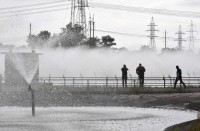WASHINGTON, United States (AFP) — US health authorities recommended a “pause” Tuesday in the use of the Johnson & Johnson Covid-19 vaccine “out of an abundance of caution” over potential links to a rare type of blood clot, in a blow to the country’s immunization campaign.
The disorder appears similar to that observed in rare cases of people who received the AstraZeneca vaccine in Europe — and the shots by both companies are based on adenovirus vector technology.
The US Food and Drug Administration and the Centers for Disease Control are assessing the “potential significance” of six reported cases of a type of clot in the brain called cerebral venous sinus thrombosis (CVST) in combination with low levels of blood platelets (thrombocytopenia).
All the cases involved women between the ages of 18 and 48, and symptoms occurred six to 14 days after vaccination.
As of Monday more than 6.8 million doses of the single-shot J&J vaccine had been administered in the US — meaning that the rare effect appears to have been detected in around one in a million cases.
“People who have received the J&J vaccine who develop severe headache, abdominal pain, leg pain, or shortness of breath within three weeks after vaccination should contact their health care provider,” the FDA said.
The CDC will convene a meeting of a top expert committee on Wednesday to further assess these cases and their significance, and the FDA will also carry out its own investigation.
“Until that process is complete, we are recommending this pause out of an abundance of caution,” it said, to ensure the medical community was aware of the development and could develop appropriate treatment plans.
The pause deals a hit to the United States’ Covid vaccination campaign, which has so far administered 45 percent of the adult population at least one dose — among the most rapid rates in the world.
The J&J vaccine was celebrated for the fact it can be stored at fridge temperature and requires just one dose — unlike Pfizer and Moderna that need two and require freezing.
But even before the pause, the company was affected by supply problems after a contractor spoiled 15 million doses that never ended up shipping.
Nonetheless, with Pfizer and Moderna continuing to deliver their hundreds of millions of promised doses on time, the US is likely to maintain a high vaccination pace.
Demographic restrictions?
The FDA said that normally, an anticoagulant drug called heparin is used to treat these blood clots, but in this case administering heparin might be dangerous.
That might be because the disorder resembles a rare reaction to heparin, in which the body forms antibodies in response to the thinner which in turn triggers platelets to form dangerous clots.
A team of German and Austrian scientists has previously suggested a biological mechanism by which this might have occurred for the AstraZeneca vaccine.
These have led to difficult regulatory choices because even though the effect is serious and can be deadly, the risks posed fall in the order of a few in a million, while the threats to adults from severe Covid are a few in a hundred.
Commenting on the development, University of Florida infectious disease and vaccine design specialist Natalie Dean tweeted that “a pause is not permanent” and that the FDA is right to be responsive to safety concerns.
“We have additional insights from the AZ vaccine used in Europe, which is also adenovirus-based,” she added.
“The risk-benefit profile depends upon age, likely sex, and population incidence – As we’ve seen in Europe, one path forward may be vaccination policies that vary by age, sex.”
The FDA was set to hold a news conference later Tuesday morning.
The statement came days after the European Union’s drug regulator said it is also reviewing possible blood clot cases in people given the J&J shot.
© Agence France-Presse







